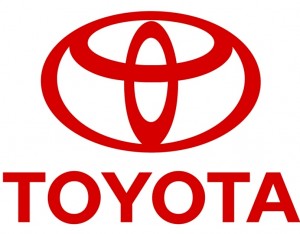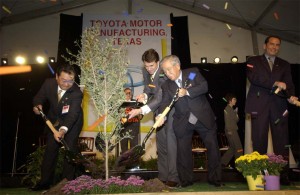Hoping to save money, Toyota Motor Co. reportedly plans to move a substantial portion of its U.S. corporate operations from Torrance, California to the suburbs of Dallas, according to several reports.
The move would be another blow to the Golden State which has struggled to retain automotive jobs over the years and would follow rival Nissan’s decision to flee suburban Los Angeles for a new headquarters near Nashville.
Toyota is expected to inform its employees on Monday of the move, according to several reports, though the maker’s chief spokesperson, Julie Hamp, said that the company “does not comment on rumors and speculation.”
It remains to be seen how such a move might be viewed in California, where Toyota is one of the most popular automotive brands, with a 22% market share. Toyota’s Prius hybrid, meanwhile, has been the state’s best-selling vehicle for two years in a row.
On the other hand, such a move would come as a major feather in the cap for Texas Governor Rick Perry, who will soon retire. He has been actively encouraging California businesses to relocate, citing lower taxes and less onerous regulations. In a recent ad aired in California, the Texas Republican noted that “Over the past year and a half, more than 50 California companies have announced plans to expand or relocate in Texas, creating more than 14,000 jobs.”
(Toyota delivers major redesign of Camry for 2015. Click Here to check it out.)
It remains to be seen how many of Toyota’s 5,300 California employees would be relocated if the reports prove accurate. The Japanese maker has a wide range of operations in the state, a large percentage of its work force based around Los Angeles, including the corporate sales, marketing, product planning and finance offices in the suburb of Torrance. Industry observers say much of that campus could be relocated to Texas, but some engineering operations, as well as an advance design studio, would likely remain in California.
The majority of Japanese automakers have been operating their U.S. headquarters in California since they began setting up distribution networks here in the 1950s and ‘60s. The major exception was, until recently, Subaru, which has long been headquartered in the New Jersey suburbs of Philadelphia.
In 2006, however, Nissan Motor Co. announced its decision to relocate the vast majority of its U.S. corporate operations to a new headquarters in Franklin, Tennessee, a fast-growing suburb of Nashville. That move was part of a cost-cutting effort by CEO Carlos Ghosn who also shifted the maker’s global HQ from a high-rise in Tokyo’s tony, but expensive, Ginza district to the less glamorous sister city of Yokohama.
Such a move can create challenges, however. Nissan wound up with only 42% of its California employees transferring to the new Nashville location. That wasn’t entirely unintentional, according to company insiders who said it offered the maker a chance to shake up its workforce. But some top managers decided to retire or find alternative work rather than leave California at the time.
(Toyota’s Lexus brand reveals new compact luxury crossover. Click Here for a closer look.)
The Golden State is the single largest U.S. market for automobiles but has been steadily losing automotive employment over the last few decades, in part because of high costs and strict government regulations, but also due to simple logistics. It’s more difficult to keep assembly and parts plants supplied so far away from the primary automotive manufacturing network that is focused in the Midwest and, increasingly, in the Southeast.
Detroit’s makers no longer operate plants in California, GM abandoning a joint venture with Toyota when it went into bankruptcy in 2009. Toyota subsequently shuttered the NUMMI factory in Fremont, a San Francisco suburb, before selling the facility to battery-car start-up Tesla Motors. Tesla today uses just a fraction of the massive facility but hopes to expand operations there as it adds more products to a line currently limited to the Model S sedan.
While Toyota has not provided details of the anticipated move to Texas, it already confirmed it will restructure the marketing organization in Torrance and will offer a “voluntary exit program” to an unspecified number of employees, with others being transferred to different jobs. That move was to begin later this week.
Toyota is no stranger to Texas, meanwhile, where it currently operates an assembly plant in Arlington that produces both its midsize Tacoma and full-size Tundra pickups.
(Click Here for news on Toyota’s recall of 6.4 million vehicles worldwide.)



